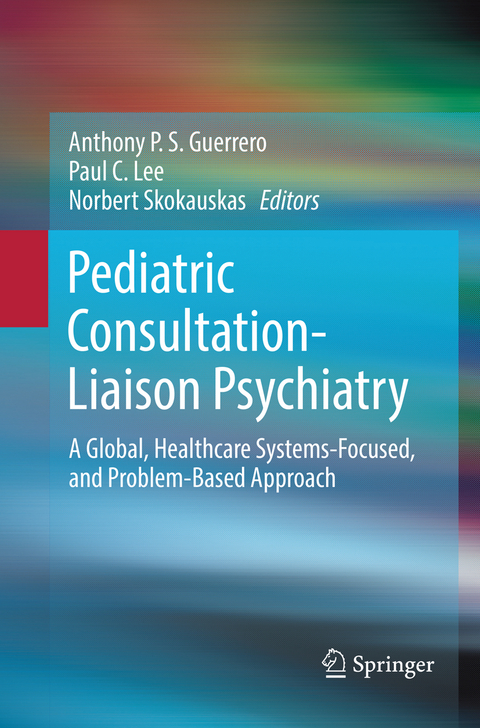
Pediatric Consultation-Liaison Psychiatry
Springer International Publishing (Verlag)
978-3-030-07784-6 (ISBN)
This ambitious resource presents an inventive approach to integrating pediatric and mental health care based in comprehensive, family-centered service delivery. Its framework adds a problem-solving focus to the core principles of pediatric consultation-liaison psychiatry, emphasizing young patients' developmental, family, and social context. An international panel of expert clinicians explores the value of the mental health component in treating complex and chronic cases across varied settings, as well as practical considerations in implementing collaborative pediatric care systemwide, including at the global level. Detailed case histories illustrate skills and traits essential to making this problem-based approach work, such as multidimensional thinking, a prevention mentality, a dedication to lifelong learning, and empathy and respect for young clients and their families.
Included in the coverage:
· Pediatric medicine for the child psychiatrist.
· Safety issues in a general medical facility setting.
· "Other medical" presentations and considerations in pediatric consultation-liaison psychiatry.
· Principles of biopsychosocial formulation and interventions in the pediatric medical setting.
· Preventive models for reducing major causes of morbidity and mortality in childhood.
Child and adolescent psychiatrists, child and school psychologists, and physicians in pediatrics, general practice, and family medicine will welcome Pediatric Consultation-Liaison Psychiatry as both a robust training text and a blueprint for the future of children's medicine.
Anthony P. S. Guerrero, M.D. is Professor and Chair of Psychiatry at the University of Hawai'i John A. Burns School of Medicine, where he completed his medical degree and his combined residency training in general pediatrics, psychiatry, and child and adolescent psychiatry. He is board-certified in these three specialties and has practiced in these three specialties for the entirety of his career. He has served in various educational roles (including director of medical student education and child and adolescent psychiatry residency program director); led the development of inpatient as well as outpatient/community-based pediatric consultation liaison services; and published peer-reviewed papers and book chapters on psychiatric education and problem-based learning, Asian and Pacific Islander mental health, and psychiatry/pediatrics interface topics. He is an Associate Editor for the Springer journal, Academic Psychiatry; senior co-editor for the 2nd edition (2016) of the Springer textbook, Problem-Based Behavioral Science and Psychiatry, 2nd Edition, and lead editor for its 1st edition (2008); and co-author of the Children and Adolescents chapter of the Springer textbook, Handbook of Consultation-Liaison Psychiatry (Leigh and Streltzer editors, 1st edition 2007, 2nd edition 2015). Paul C. Lee, M.D., M.P.H. is Associate Director of the Child and Adolescent Psychiatry Fellowship Program at Tripler Army Medical Center in Honolulu, Hawai'i. He completed his medical degree at the Medical College of Wisconsin; his psychiatry residency at the University of California, Irvine School of Medicine; his child and adolescent psychiatry fellowship at the University of California, San Diego School of Medicine; his psychosomatic medicine fellowship at Brigham and Women's Hospital/Harvard Medical School; his research fellowship at Massachusetts General Hospital/Harvard Medical School, and his Master of Public Health degree at the Harvard T.H. Chan School of Public Health. He is board-certified in psychiatry, child and adolescent psychiatry, and psychosomatic medicine. In his career, he has led the development of outpatient consultation-liaison services and has published research in tic disorders and pediatric consultation-liaison psychiatry education. Norbert Skokauskas, M.D. (Hon.), Ph.D., Gyd. Psych., CPsychI is Professor of Child and Adolescent Psychiatry at the Centre for Child and Adolescent Mental Health and Child Protection, Faculty of Medicine, Norwegian University of Science and Technology (NTNU), Norway. Previously he held a Senior Lecturer in Child and Adolescent Psychiatry post at the Department of Psychiatry, Trinity College Dublin, Ireland; and worked as a senior consultation liaison psychiatrist at the Temple Street Children's University Hospital, Dublin, Ireland. He is also a visiting Professor of Child and Adolescent Psychiatry, Department of Psychiatry and Developmental Clinical Psychology, Nagoya University, Japan; and a visiting consultant child and adolescent psychiatrist at the Institute of Mental Health, Singapore. Since 2011 he has served as Secretary General of the World Psychiatric Association, Child and Adolescent Psychiatry section and Editor of the newsletter/e-journal, World Child and Adolescent Psychiatry. He has published in the areas of biological psychiatry, neurodevelopmental disorders, global and cultural psychiatry, and psychiatric education and problem-based learning.
Introduction.- General principles of pediatric psychosomatic medicine, including developmental and systems of care perspectives.- Essential pediatrics for the pediatric consultation-liaison psychiatrist.- Essential psychiatry and substance use disorders for the non-psychiatrist.- Psychopharmacological principles .- Common scenarios and concerns in traditional inpatient pediatric consultation-liaison psychiatry.- Suicidality, self-harm and dangerousness.- Eating and feeding disorders.- Adjustment to medical illness.- Acute mental status change.- Other common medical considerations for behavioral symptoms.- Contemporary value-building roles spanning inpatient and outpatient care.- Principles of bio-psycho-social formulations and interventions in medical settings (case examples from pediatric nephrology, pediatric gastroenterology).- Psychological testing and pre-procedure evaluation (case example from pediatric cardiology, pediatric endocrinology, pediatriconcology,).- Improving adherence and promoting behavioral change (case example from adolescent medicine, pediatric allergy/pulmonology, etc.).- Identifying and managing brain/behavioral conditions (case example from pediatric rheumatology, pediatric neurology, etc.) .- Multidisciplinary management of complex conditions (case example from genetics, etc.).- Interfacing with palliative and end-of-life care and ethical decisions (case example from neonatology, etc.).- Healthcare systems and global perspectives.-Administrative and financing models.- Patient experience, safety, and quality.- Primary care integration.- Preventive models for reducing major causes of morbidity and mortality in childhood.- Addressing healthcare disparities.- Complementary and alternative approaches to improving comfort and access.- Pediatric psychosomatic medical approach to optimize global access to child and adolescent mental healthcare.- Appendices.- Teaching tools: basic psychiatry for other children's healthcare professionals.- Screening tools.- "Talking points" for justifying the value of pediatric psychosomatic medicine services.
| Erscheinungsdatum | 28.01.2019 |
|---|---|
| Zusatzinfo | XVII, 437 p. 23 illus., 16 illus. in color. |
| Verlagsort | Cham |
| Sprache | englisch |
| Maße | 155 x 235 mm |
| Gewicht | 700 g |
| Themenwelt | Geisteswissenschaften ► Psychologie ► Entwicklungspsychologie |
| Medizin / Pharmazie ► Medizinische Fachgebiete ► Psychiatrie / Psychotherapie | |
| Schlagworte | Child and Adolescent Psychiatry • child co-morbidity • child palliative care • children's hospitals • global child and adolescent health • medically ill children • multidisciplinary management of complex pediatric • multidisciplinary management of complex pediatric conditions • Pediatric consultation-liaison psychiatry • Pediatric psychosomatic medicine • physically ill children • primary care integration • problem-based learning psychiatry • psychiatry accountable care • psychiatry health care reform • symptom-based child psychiatry |
| ISBN-10 | 3-030-07784-5 / 3030077845 |
| ISBN-13 | 978-3-030-07784-6 / 9783030077846 |
| Zustand | Neuware |
| Informationen gemäß Produktsicherheitsverordnung (GPSR) | |
| Haben Sie eine Frage zum Produkt? |
aus dem Bereich


